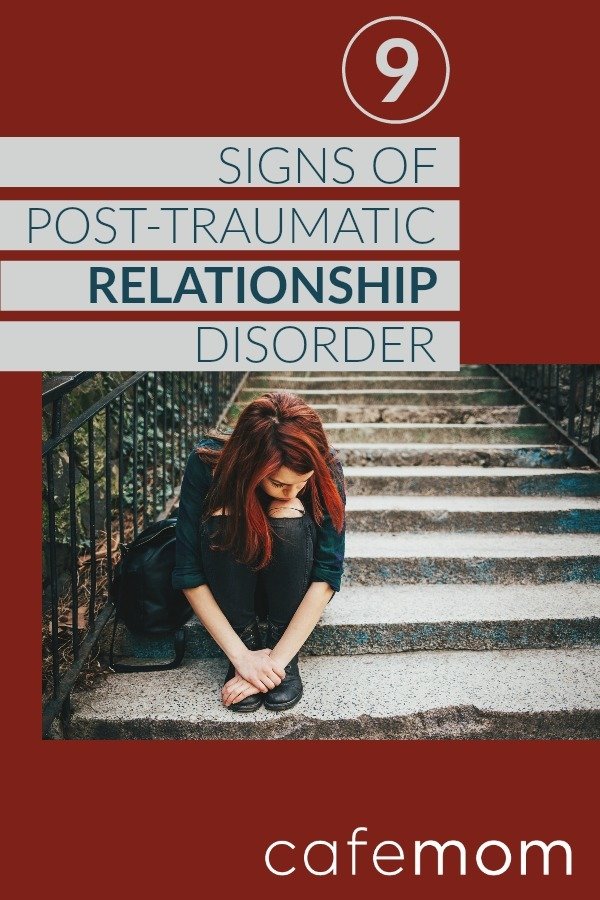Post-traumatic stress disorder — characterized by anxiety, distrust, nightmares, even flashbacks — is normally associated with military veterans. It's no surprise that vets could come back from a war zone and be out of whack emotionally. But people can suffer PTSD after a variety of traumatic situations, such as being the victim of violence, sexual assault, or a terrible childhood. So what about relationships? Believe it or not, a toxic relationship can also trigger PTSD symptoms.
More from CafeMom: 10 Women Share the Crazy Ways They Caught Him Cheating
Licensed psychologist and author of Emotional Unavailability Bryn Collins says she sees plenty of clients who have suffered through extremely stressful relationships and now have this disorder. Although it's not an official medical diagnosis (and it's highly unlikely an insurance company would pay to treat it), she says it is very real, and very devastating.
More from CafeMom: 13 Women Confess Why They Stayed Married After He Cheated
One might believe that feeling upset about past relationships might signal immaturity, but this is not the case. Post-traumatic relationship disorder is a real affliction — and it can be hard to shake if it is causing someone pain.
More from CafeMom: 9 Poignant Divorce Quotes That Will Mend a Broken Heart
Here are 9 signs that show that a person might have post-traumatic relationship disorder — and what to do about it.

Extremely Suspicious & Distrusting

Relationships in which there was violence, sexual assault, threats, cheating, financial abuse, emotional abuse, alcoholism, chronic lying, or narcissism on the part of your partner can wreak long-term havoc on your emotional state. You can be left with a heightened sense of suspicion and distrust, and it may take you a long time to feel like you can trust anyone again.
"I was an emotional wreck," says 37-year-old Erica, who spent three years in an abusive relationship with a narcissist. He once made her return clothes to a store because she looked like a "whore," threatened that he would leave her if she didn't stop being vegetarian and started eating meat again, forced her to get down on her knees and apologize for nothing just to "teach me to swallow my pride," and other incidents. "He broke me," she says. "I had no backbone left."
Flashbacks

While most people think of flashbacks as something only a vet has, Collins says that people who have suffered extreme relationship distress can also have them. They may take the "typical" form of visual or auditory hallucinations, but they also may be moments where a prior traumatic relationship event comes back to you full force. You can see it, hear it, smell it. It's like it just happened. Women who have been in abusive situations can be especially prone to these episodes.
Nightmares

Vivid nightmares can be sign of PTRD. So can nightmares where your ex or spouse is leaving you, cheating on you, yelling at you or your children, beating you or your children or pets, lying to you, or those in which you otherwise feel vulnerable, scared, and unsafe. People can have dreams like this in even good relationships, but having them frequently is definitely a sign that something is very wrong.
More from CafeMom: 11 Things Women Don't Need Their Partner's Permission to Do
Obsessing

Obsessing about a relationship, whether you are in it or long out of it, is a sign that something isn't right. It's normal to think about your relationship, especially if it needs work, but if it's ALL you can think about, then you might have PTRD.
"Obsessing about what you could have done differently, saying 'I'm a smart woman, how did I let this happen?' etc., and constantly wondering what you could have done better, self-blaming, and trying to fix the past can definitely be a sign that you need help," says Collins. Finding yourself staring (again!) at his Facebook page in the wee hours of the morning, or unable to follow a discussion with friends, or starting every other sentence with "And then he …" means you're obsessing. "Obsessing is like drinking poison and expecting someone else to die," says Collins. "Stop giving them free rent in your head. Is he thinking about you? Probably not."
Excessive Crying/Mourning

Crying constantly or crying in the midst of work, playing with your children, or other activities can be a major sign of PTRD. So can crying and mourning that has gone on way too long. Says Collins: "If you're still sobbing about Jeff or Melissa three years after you broke up, it might be an indicator you need some therapy. In general, healthy people tend to grieve heavily for one month for every year of the relationship. Excessively more than that could mean you have a problem."
Weight Gain or Loss & Other Health Problems

Your appetite can be a big indicator of your emotions, and rapidly gaining or losing weight can be a sign something is wrong. Your entire relationship with your body and your general health can take a nosedive when you have PTRD. Erica, who was involved with the diagnosed narcissist for three years, says that by the time the relationship was over, she had suffered through shingles, high blood pressure, migraines, four kidney stone operations, and "felt physically sick all the time." Months after ending the relationship and entering therapy, Erica says she rarely experiences any of the health issues that plagued her during the time she and her abusive ex dated.
More from CafeMom: 15 Signs You're in an Emotionally Abusive Relationship
Self Blaming

Women tend to chronically self blame, while men tend to blame others. Constantly taking on the blame for a partner who abused you emotionally or physically, and constantly parsing how you could have done better, what you could have said differently, or how you "drove" him to his behavior, is a sign of PTRD.
Negative Reactions to Familiar Situations

Negative reactions to things you used to do with your ex can be a sign of PTRD. Perhaps you used to love horseback riding with your ex but now you can't stand the sight of horses because it reminds you of him. Or you used to adore Italian food, but now you can't stand the smell of pasta because you two used to eat it together all the time. Maybe you watch other happy couples on the street with extreme hostility. These types of reactions might be normal just after a breakup, but by the time you've passed your "average length" to get over a split, these negative thoughts should have mostly dissipated.
Sexual Promiscuity

While there's a certain "get out there and have fun!" mentality that reigns after a breakup, too much of that, or putting too much store in sex making you "happy," means you could have PTRD. Women who have suffered sexual assault can turn to intimate encounters as a way of taking back their sexual power — but it's not a healthy way to do it. Women with PTRD see sex as a way of getting the love and affection they truly want — but sex without love is just that. That isn't to say that women can't have fun, casual sex if they truly want it, but most women who are coming off a traumatic relationship really just want to heal. Sex will only make you feel better temporarily, and then you still have all of your emotional turmoil to deal with.
More from CafeMom: 7 Things You Should Consider Before Getting Back Together With Your Ex
How to Heal From PTRD

PTRD is treatable. Therapy, support groups, and self-help books can be a great start. If you can't afford a therapist, try a free support group such as Alcoholics Anonymous, Sex Addicts Anonymous, or Overeaters Anonymous. Online support groups like BaggageReclaim, LoveFraud, TheNarcissisticPersonality, and LisaEScott can offer you many anonymous sympathetic ears. Exercise, long baths, walks in the woods, volunteer work, and getting back in touch with passions you've long given up can all help heal the soul. Erica, for one, has taken up painting again. Create boundaries. Learn how to say "no" without guilt. "Don't let people suck the emotional energy out of you," says Collins. Most importantly, learning to forgive yourself, and accepting that it wasn't your fault, is key to overcoming PTRD.
Says Erica: "Now I know I'm not crazy. There's nothing I could have done differently — he'd still be the same person. Now I look at it as he's somebody else's problem, not mine."
It helps to know you're not alone, too."Know you're not the first person this has happened to, you got blindsided," Collins says. "You can't change the past, can't go back and edit the great videotape of life. But you can change your future."




